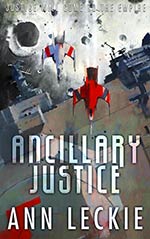
![]() everythinginstatic
everythinginstatic
1/23/2018
![]()
Sometimes, I can't believe how much I can lag behind on trends. I think, to an extent, I'm just afraid of hype. Particularly with something like Ancillary Justice, which also happened to win all the awards ever, where I desperately wanted to love it (especially since recently I've been on more of a fantasy than sci-fi kick).
This is, for all intents and purposes, a revenge story. Breq was once Justice of Toren, a huge warship in the Radch Empire, home to thousands of officers and ancillaries, segments which share consciousness, all serving the colonising attempts of the empire and its attempts to civilise the galaxy. But an act of betrayal means that Breq is all that's left of that intelligence and Breq has a very audacious plan for revenge. She may only have this one fragile body left, but this may just be enough to get her where she needs to be.
I find it amusing that one of the key things I remember about this book is how much people complained about its treatment of gender and how confusing they found it. And yet how much has changed between this and Too Like the Lightning, because in Ancillary Justice the big gender issue is the default pronoun is female. That may have been revolutionary when this first came out, but it's amazing quite how far we've moved away from this. I will still say that I approve of Leckie's approach, because while I was reading this, I would adjust my own biases and images of characters in my head. It was a worthwhile exercise and one I would like to see more authors engage in, especially in speculative fiction.
Ancillary Justice does a great job of revealing its world, the Radch Empire and the ways of its ruler. But it also raises some questions of humanity and colonialism. Breq is a great set of eyes to see all this through, seeing as she was a ship once and therefore bound (to an extent) to follow the will and orders of Anaander Mianaai, but one with some measure of independence. Not to mention the fact that the ancillaries are not drones, they are not just mindless zombies driven by the will of the ship's AI. As Leckie's novel goes on, we start to see that these ancillaries, though they are not human (not by Radchaai standards, nor perhaps our own), as being individuals and I found that idea incredibly interesting: if they can feel emotions, if they can have individual favourites among the crew, if they can feel revenge and want change, how much more different are they from actual humans? And yet Breq's voice is, at times, terrifying and detached. Leckie straddles that line between complete detachment and investment incredibly well, swinging from making us understand Breq's motives and decisions and then making her seem aloof and different, perhaps more alien than the Presger.
It is not, to begin with, a terribly fast-paced novel (though I do admit that it changes by the end and how, almost like the climax of a Bond film). It is introspective at times and it allows you to make up your own mind about Breq's approach to all of this. But it asks questions of its readers too, without necessarily providing the answers either. If the end result of all this expansion is civilisation, then are the Radch Empire's methods completely excusable? Are the citizens completely happy, or does Breq assume them to be happy and therefore her views of them are coloured in this fashion? Are the Presger truly as alien as Anaander Mianaai makes them out to be? Are the methods to these annexations truly the best possible way (again, does the end truly justify the means)?
In all of this, there is Seivarden Vendaai too, someone that Breq has a link with, someone who should be dead but isn't, a Radchaai out of time. She (though Seivarden is male) is almost a foible to Breq, to an extent, remembering annexations and the way the Radch used to be from the perspective of one who was not an ancillary, but a captain of their own ship and someone of good breeding, at a time when perhaps some change is coming to the empire. As someone remarks at one point, does this imply that the aptitude tests can be 'fixed' to give results to those from a lesser standing, should they even be allowed to serve? Can they be proper Radchaai citizens?
I am thoroughly impressed with what Leckie has done here. This is space opera at its finest, a world that comes alive by the end and leaves yet more questions for the next book. I am completely taken in by Breq, by the Radchaai and the Empire, by all the questions of morality and humanity that Ancillary Justice brings to the table. I really hope it won't take me as long to read Ancillary Sword as it did to pick up this book.